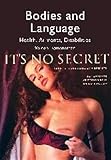Bodies and Language : Health, Ailments, Disabilities / Vaidehi Ramanathan.
Material type: TextPublisher: Bristol ; Blue Ridge Summit : Multilingual Matters, [2009]Copyright date: ©2009Description: 1 online resource (152 p.)Content type:
TextPublisher: Bristol ; Blue Ridge Summit : Multilingual Matters, [2009]Copyright date: ©2009Description: 1 online resource (152 p.)Content type: - 9781847692368
- 9781847692375
- 306.44 22
- RA418
- online - DeGruyter
| Item type | Current library | Call number | URL | Status | Notes | Barcode | |
|---|---|---|---|---|---|---|---|
 eBook
eBook
|
Biblioteca "Angelicum" Pont. Univ. S.Tommaso d'Aquino Nuvola online | online - DeGruyter (Browse shelf(Opens below)) | Online access | Not for loan (Accesso limitato) | Accesso per gli utenti autorizzati / Access for authorized users | (dgr)9781847692375 |
Browsing Biblioteca "Angelicum" Pont. Univ. S.Tommaso d'Aquino shelves, Shelving location: Nuvola online Close shelf browser (Hides shelf browser)

|

|

|

|

|

|

|
||
| online - DeGruyter Language Diversity in the Classroom / | online - DeGruyter China and English : Globalisation and the Dilemmas of Identity / | online - DeGruyter Hybrid Identities and Adolescent Girls : Being 'Half' in Japan / | online - DeGruyter Bodies and Language : Health, Ailments, Disabilities / | online - DeGruyter TheSociolinguistic Competence of Immersion Students / | online - DeGruyter Neurolinguistic and Psycholinguistic Perspectives on SLA / | online - DeGruyter Strategic Language Learning : The Roles of Agency and Context / |
Frontmatter -- Contents -- Acknowledgments -- Chapter 1: Introduction: Why Bodies Matter -- Chapter 2: On Metaprescriptive Utterances: Cancer, Breasts and Gazes -- Chapter 3: Scripting Selves: (Auto)Biographical Writing of Alzheimer Patients and Caregivers -- Chapter 4: Poststructuralist Discourses and Chronic Ailments: (Type-1) Diabetes, Epilepsy and Body Breakdowns -- Chapter 5: Communication Challenges: Autism, Partial Hearing and Parental Choices -- Chapter 6: Texts and Meaning-Making: Critical Revisitations in Ailment/ Disability-Related Research -- Chapter 7: Critical Ailment Research in Applied Sociolinguistics: Power, Perception and Social Change -- References -- Index
restricted access online access with authorization star
http://purl.org/coar/access_right/c_16ec
This book critically addresses the role of language in our collective construction of ‘normal’ bodies. Addressing a range of concerns linked with visible and invisible, chronic and terminal conditions, the volume probes issues in and around patient and caregiver accounts. Focussing on body conditions associated with breast cancer, Alzheimer’s disease, (type-1) diabetes, epilepsy, partial hearing and autism, the book draws on a range of critical theories to contest collectively assembled notions of ‘abnormality,’ ‘disability’ and ‘impairments.’ It also addresses the need for applied sociolinguists to take account of how our researching practices - the texts we produce, the orientations we assume, the theoretical grounds from which we proceed-- create ‘meanings’ about bodies and ‘normalcy,’ and the importance of remaining ever vigilant and civically responsible in what we do or claim to do.
Mode of access: Internet via World Wide Web.
In English.
Description based on online resource; title from PDF title page (publisher's Web site, viewed 01. Dez 2022)


